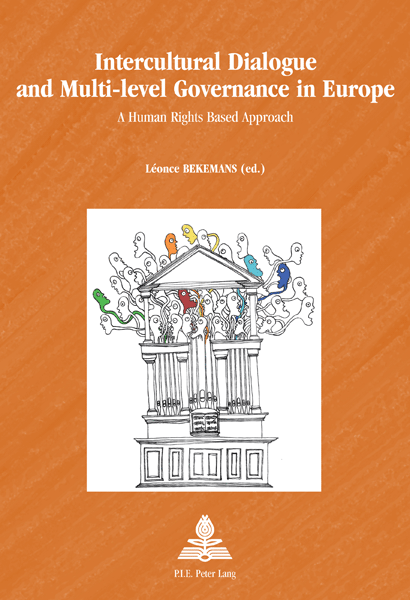Raccolte

Intercultural Dialogue and Multi-Level Governance in Europe
Léonce Bekemans (2012)
- Tipologia pubblicazione
- Volume
- Casa editrice
- Peter Lang International Academic Publishers
- Città
- Bruxelles
- Pagine
- 604
- ISBN
- 978-90-5201-871-3
- Lingua
- IT
This book offers an interdisciplinary and in-depth analysis of the relationship between intercultural dialogue and multi-level governance, seen from a human rights-based perspective. It brings together papers that were originally presented at international workshops organised by the Jean Monnet Centre of Excellence of the University of Padua in 2010-2011 with some additional contributions. The authors deal with a broad and diversified framework of concepts, policy approaches and linkages between multi-level governance and intercultural dialogue, particularly in the fields of education and civil society participation. The volume follows a multi-disciplinary approach and presents these readings and reflections for an audience of scholars, as well as individuals and organisations interested in issues around human rights, governance, education and civil society. Its innovative approach addresses the complex issues of today's societies, which are in need of sustainable, coherent and responsible answers at both the conceptual and the policy level.
In short, the book proposes a reading of interconnecting trajectories from governance building, education and civil society to intercultural dialogue in Europe. It is grounded in a human rights perspective and responds to the need for a policy-oriented but value-driven European future.
Léonce Bekemans holds the Jean Monnet Chair for Globalisation, Intercultural Dialogue and Inclusiveness in the EU at the University of Padua, where he is academic coordinator of the Jean Monnet Centre of Excellence and collaborates with the Interdepartmental Centre on Human Rights.
Table of Contents
Editorial Note
General Introduction
Léonce Bekemans
PART I. GENERAL CONCEPTS
Introduction
Léonce Bekemans
Value Roots for Multi-level Governance and Intercultural Dialogue
Antonio Papisca
Values, Intercultural Dialogue and Making it Pay to be Good: a Research Agenda and Policy Approach for the European Union
Peter G. Xuereb
The Future for European Society: Subsidiarity, Federalism, New Humanism
Dario Velo
Thoughts on Autonomy in Policy and Law within the European Higher Education Space
Jan De Groof
Multi-level Governance and Intercultural Dialogue: The Prospects for 2020
Luc Van den Brande
PART II. GOVERNANCE OF INTERCULTURAL DIALOGUE
Introduction
Léonce Bekemans
SUBSECTION I. PERSPECTIVES AND CHALLENGES
A Cosmopolitan Perspective of Multi-level Governance in Europe
Léonce Bekemans
Multi-level Governance in Regional Perspective
Frank Delmartino
Active Citizenship and the European Public Sphere – State of the Art and Way Forward
Luciano Morganti
SUBSECTION II. SECTORAL APPROACHES
The Committee of the Region’s White Paper on Multi-level Governance: Perspectives for a Partnership-based European Union 2020-2030
Hendrik Theunissen and Luc Van den Brande
Diversity in the Cities
Enzo Pace
The Practice of Territorial Dialogue in Europe: The View of a Practitioner
Paul Breyne
SUBSECTION III. CASE STUDIES
The Sub-national Authorities in a Multi-level Governance Setting – the Silesian Case Study
Rafał Riedel
Interregional Parliamentary Assemblies: a New Layer in the Multi-level Global Governance System
Andrea Cofelice
The European Court of Human Rights: a New Actor of Multi-level Governance?
Paolo De Stefani
The International Criminal Court in a Multi-level Governance System of International Criminal Justice
Claudia Pividori
PART III. EDUCATION TO INTERCULTURAL DIALOGUE
Introduction
Léonce Bekemans
SUBSECTION I. PERSPECTIVES AND CHALLENGES
Education to Intercultural Dialogue
Enrique Banús
Multiculturalism vs. Interculturalism in Educational Practices
Gabriel Fragnière
Intercultural Dialogue in Territorial Cooperation: an Education Perspective
Luc Van den Brande
SUBSECTION II. SECTORAL APPROACHES
The Regional Dimension of Educational and Intercultural Practices: a Forward-looking Multi-level Governance View of the CoR
Béatrice Taulègne
Improving Intercultural Dialogue through Lifelong Learning and Multi-level Governance: the Experience of the European Training Foundation in the Partner Countries of the EU
Madlen Serban
SUBSECTION III. CASE STUDIES
Roadmap for a Euro-Mediterranean Cross-Cultural Education: the Experience of Adyan Understanding Programme
Fadi Daou and Nayla Tabbara
Education and Citizenship: a Good Practice from the Region of Veneto
Lucia Saccon and Amelia Goffi
PART IV. CIVIL SOCIETY PARTICIPATION TO INTERCULTURAL DIALOGUE
Introduction
Léonce Bekemans
SUBSECTION I. PERSPECTIVES AND CHALLENGES
Civil Society Participation in Intercultural Dialogue
Manuel Manonelles
Civil Society in Intercultural Dialogue, Democracy and Governance
Robin Wilson
Civil Society in Intercultural Dialogue: the Tension between Individual and Collective Rights
Vesna Čopič
Civil Society Organisations in the European Architecture of Multi-level Governance
Marco Mascia
Cultural Organisations and Intercultural Dialogue
Yudhishthir Raj Isar
The Role of Religion in Civil Society and Intercultural Dialogue: a Cross-Cultural and Comparative Perspective
John Farina
SUBSECTION II. SECTORAL APPROACHES
Euro-Med Intercultural Trends and Major Challenges for the Civil Society Dialogue
Gemma Aubarell
Intercultural Dialogue as a Means for Building Mutual Trust: the Role of Civil Society
Pietro de Perini
Participatory Democracy and the Role of Local Authorities and Civil Society
Antonella Valmorbida
SUBSECTION III. CASE STUDIES
Community-based and Context-driven Architecture for Educating Deaf Children in Burundi
Laurens Bekemans and Ken De Cooman
Dialogue-building of Rural Development in Somalia: the Proposals of the International Somali Forum for Rural Development
Elena Pisani
A Socio-ecological Architecture: Building a Well for the Children of San Pedro in Peru
Erika Ebermann Vera
Notes on Contributors

